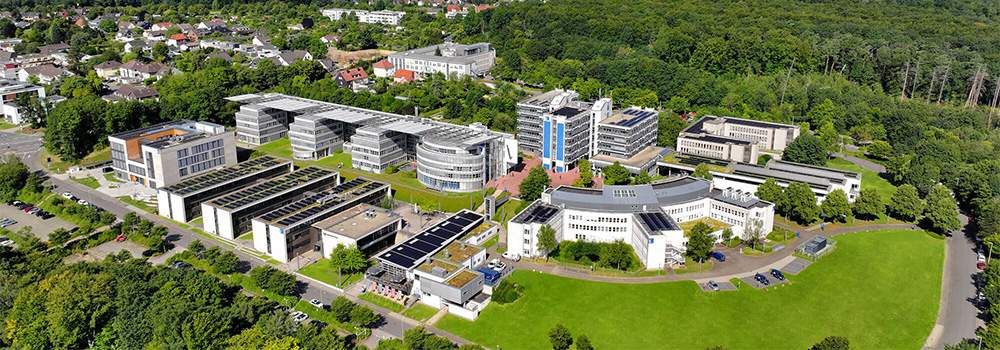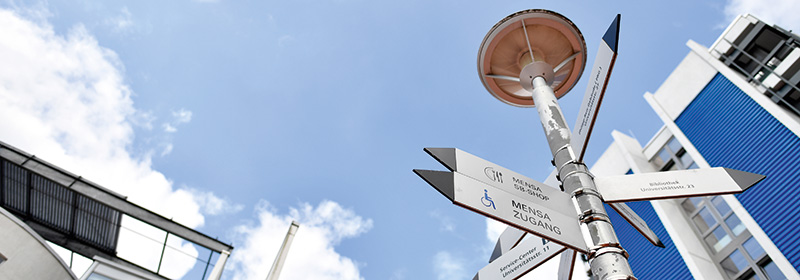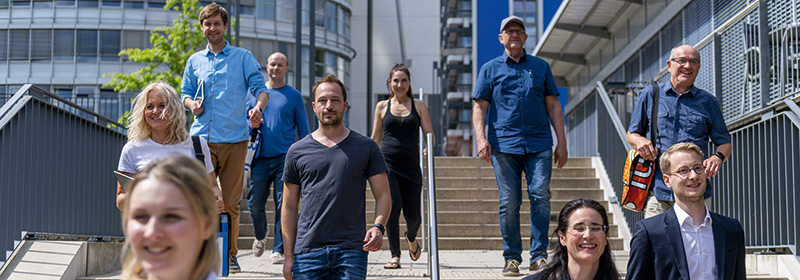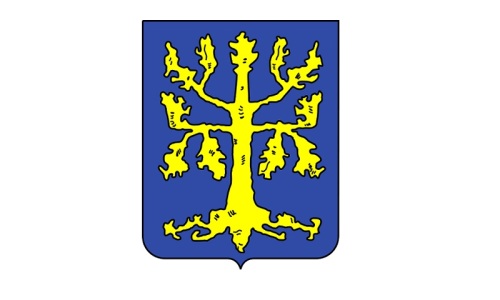Welcome to the FernUniversität in Hagen
 Photo: FernUniversität in Hagen/Markus Kecker
Photo: FernUniversität in Hagen/Markus Kecker
Go directly to: Faculties and Services | Working at the University | International Office | City of Hagen | Everyday tips
Faculties and Services
 Photo: Jörg Koch
Photo: Jörg KochHere you will find an overview of the FernUni faculties and other important institutions.
- Faculties
- University Library (UB)
- Center for Digitalization and IT (ZDI)
- Refectory menu in English (this week’s menu)
International Office at the FernUniversität in Hagen
 Photo: Jakob Studnar
Photo: Jakob Studnar
The FernUniversität in Hagen welcomes guests from all around the world to its campus. The Team at the International Office will be happy to advise you!
As a modern European university, FernUniversität in Hagen sees internationalization as a key driver in advancing teaching, research, and the development of young talent. Internationalization is anchored as a management and core task of the university.
Over the course of a history that now spans 50 years, the FernUniversität has established numerous international university cooperations and partnerships in a wide variety of forms and covering many different topics of international cooperation. At the FernUniversität, the five faculties actively cultivate and expand academic relationships with researchers and lecturers from international universities and professional societies, aligning with their specific needs and potential. These collaborations range from research partnerships and extensive Erasmus+ programs to summer schools, double degree programs, and visiting scholar exchanges.
The City of Hagen
The “City of Four Rivers” offers a wide range of opportunities for cultural, architectural, artistic, sporting, hiking and shopping experiences. Hagen is not just the “gateway to the Sauerland, but also located on the edge of the Ruhr region with all its industrial heritage.
Information for International Researchers
To help you settle into your new home quickly, it’s important to make sure you also have a stress-free daily life outside the university. However, German bureaucracy can be daunting, especially if you’re planing on staying in Germany for an extended period of time, and if it’s your first time in the country! We will do our best to help you overcome these initial hurdles quickly and, with that in mind, we have put together some important information for you below.
Preparing for Your Stay
To make sure that everything runs smoothly during your stay in Hagen and that you can get started right away, it is important to take care of a few things in advance. Finding a place to live, for example, can take some time and you should start looking as early as possible.
-
Checklist – Before You Set Out
- Plan the dates, goal(s) and, if applicable, topics of your planned (research) stay with your host at the FernUniversität at an early stage and inform the International Office at the FernUniversität.
- Find out about the (financial and legal) framework.
- Make sure you have all the required documents, e.g:
- Passport/ID document (also for any accompanying family members), valid for at least the duration of your stay in Hagen
- Visa (if required, also for any accompanying family members) or residence permit or EU Blue Card
- Invitation from the university, hosting agreement and/or scholarship notification
- Proof of funding for your stay (scholarship confirmation, proof of income), preferably in German or English
- Proof of (European) health insurance, preferably in German or English (A1 certificate)
- (Biometric) passport photos
- Birth/marriage certificate(s), officially certified and in German or English translation (also for any accompanying family members)
- Copy/copies of school/academic qualifications, if possible officially certified and in German or English translation
- Vaccination certificate, important documents regarding illnesses or medication
- International/foreign driver’s license (with German or English translation if applicable)
- Credit card and/or EC card
- To find out more housing and childcare options see the section “Accommodation”).
- Provide the host institute and/or the International Office with an emergency contact in the event of a crisis (preferably someone who can speak English or German).
Checklist – For arrival/within one week of entry
- Contact your host to discuss what you need to do over the next few days, especially with regard to your workplace equipment (computer, telephone, Internet access, library card, etc.).
- Sign the tenancy/rental agreement and have the landlord/landlady sign the “Wohnungsgeberbestätigung” form – you will need this for the Residents’ Registration Office (Einwohnermeldeamt) and/or the Immigration Office (Ausländerbehörde).
- Register at the Registration Office of the City of Hagen (and your accompanying family members, if applicable). You will receive the following documents, which you should keep in a safe place and make a copy or copies of:
- Registration certificate (e.g. as proof of address for opening a bank account)
- Police certificate of conduct, if applicable (for employment in the public sector)
- Tax identification number, if applicable (for employment at the FernUniversität in Hagen)
- For citizens of a non-EU country (with the appopriate entry visa) and those staying in Hagen for longer than 3 months: Registration or application and extension of residence (and any accompanying family members) at the Immigration Office of the City of Hagen.
- If necessary, sign your employment contract and find about about possible tax contributions, pension entitlements and the Federal and State Fund (VBL).
- Open a bank account if you need to.
- Register your child/children at kindergarten or school (if you have any).
- Register for a German course if you need to.
Other important information:
Visa
Citizens from non-EU countries (“third-country nationals” TCN) generally require a visa to enter Germany. There are different types of visa depending on the duration and purpose of your stay,- Student visa (also for doctoral students),
- Schengen visa (up to three months) and
- National visa (“D-Visa”).
- Residence permit (for stays of more than 3 months, etc.).
If possible, you should avoid entering Germany on a tourist visa, as tourists are not allowed to work or apply for a residence permit.
Processing a visa application can take from a few weeks to several months, so apply for your visa (and that of any accompanying family members) as early as possible. Please contact a German diplomatic office abroad (an embassy or consulate) in your home country in good time to find out which regulations apply to you. Addresses and information can also be found at the Foreign Office.
Citizens from EU and EEA member states and Switzerland do not require an entry visa; an identity card or passport is sufficient for entry.
Link tips:
- EURAXESS – Information on visas, social security, taxes, etc. for internationally mobile researchers
- Research in Germany – Overview of the German research and funding landscape
Residence Permit
Citizens from non-EU countries usually require a residence permit. Depending on the duration and purpose of your stay, there are different residence permits with different requirements and rights, e.g.
- For studying (including doctorate, §16),
- Employment (§18),
- EU Blue Card (§19a), and
- Research (§20).
Please apply for a corresponding residence permit at the Immigration Office (Ausländerbehörde) in good time before your entry visa expires. If your residence permit cannot be extended in time, a so-called “fictional certificate” can be issued as a temporary replacement document under certain conditions.
Opening a Bank Account
It makes sense to open a current account at a bank or savings bank in Germany if you are staying in Germany for an extended period of time and/or have regular payments such as rent or regularly receive a salary/scholarship. You can usually open a bank account at any branch with your passport/ID card and your registration certificate/residence permit. Fees and services vary slightly depending on the financial institution, so seek advice beforehand.
Tip:
Those holding scholarships from German funding organizations, such as the DAAD or the AvH, do not have to pay fees for either their visa or residence permit.
-
For short stays (or to tide you over until you have found a rented apartment), the Student Hostel (Bildungsherberge) or nearby hotels are a practical accommodation option. The FernUniversität also has a partnership with a housing provider where you can rent both furnished and unfurnished apartments. Below you will find details, contacts and some information on tenant obligations in Germany.
Accommodation
- General information on the topic of “Living in Germany”
- Student Hostel (Bildungsherberge): The student hostel offers all students of the FernUniversität in Hagen affordable accommodation (24.00 EUR/night in a single room) in the immediate vicinity of the FernUni.
- Spending the night in Hagen: You can find more useful information about staying overnight in hotels, vacation apartments, guesthouses, and youth hostels in and around Hagen in this brochure from the HAGENagentur.
- Apartments for new employees and visiting academics: The FernUniversität cooperates with the housing provider ha.ge.we in Hagen. Via this collaboration, new employees can rent living space in the form of small apartments. Fully furnished apartments are also available on request, many of which are close to the campus. Guest researchers can also rent this accommodation on a short to medium-term basis (from 1 to 8 months). The rental agreement is concluded directly with ha.ge.we. Further information can be found in this flyer on housing cooperation (PDF 1013 KB). For information on currently available apartments and rental conditions, please call your contact person at ha.ge.we, Ms. Barbara Bodyn, on +49 2331 3110634.
- General information on finding accommodation: Apartments in the center of Hagen are relatively easy to find, while apartments in the immediate vicinity of the campus are rarer. In addition to finding an apartment via our cooperation partner, you can simply enter the terms “apartment, Hagen, NRW” in the search engine of your choice and you will find numerous suitable results.
Renter’s Obligations
- Deposit and additional costs: A tenancy agreement usually requires a deposit to be paid in advance, which you will receive back at the end of the tenancy. For apartments, this may not exceed three months’ rent (basic rent without rates). At the start of the tenancy, the deposit is usually paid into a rent deposit account that is held exclusively in the tenant’s name. In addition to your monthly basic rent, you will also have to pay certain service charges. These are usually explicitly mentioned in the rental agreement. Service charges are costs linked to the use of the rented property, such as heating and hot water costs. They also includes costs for janitorial services, snow clearance, garden maintenance, fees for garbage removal, water and waste water, general electricity in the stairwell, cellar and laundry room, and cable TV fees. As a tenant, you have the right to ask your landlord or landlady for a detailed statement of service charges.
- TV license fee
Since January 2013, all households in Germany have been obliged to pay a standard fee of 210 euros per year, even if they do not own a television or PC or use the services of public broadcasters. Further information on conditions and registration (in English). - Moving in: As you can only receive mail and visitors if your letterbox and doorbell have a name plate, you should write your name on both plates. Please also note that you are legally required to register with the Residents’ Registration Office (Einwohnermeldeamt) within two weeks of moving in.
-
Social insurance in Germany
Most employees in Germany are protected by legally regulated institutions against losses that could affect their individual livelihood and that of the community. There are currently five branches of social insurance, which are briefly presented here. Please note, that we have only listed the basics here. Depending on your individual working and living conditions, special regulations may apply. If you have any questions, please do not hesitate to contact the personnel officer responsible for you.
1. Health Insurance
Health insurance covers the costs of medical treatment, medicines, remedies and aids. Health insurance is compulsory in Germany. Students can acquire health insurance cover, e.g., as part of a family insurance scheme (i.e., they are co-insured via a parent, free of charge) or by taking out their own statutory or private health insurance.
If you are employed at the FernUniversität, you will be insured with a statutory health insurance company of your choice. Anyone wishing to make use of this option must submit a membership certificate from the corresponding health insurance company to their employer no later than two weeks after the start of employment. If this is not done in good time, employees will either be registered with the health insurance provider with which they were last insured or the employer will choose a health insurer. Above a certain income limit, employees have the option to register with a private health insurance company.
The FernUniversität is not allowed to give advice or recommendations on the choice of health insurance provider. Therefore, please contact the health insurance companies yourself to find out about possible insurance rates.
Contributions to statutory health insurance are generally paid proportionately by the employer and the employee. The employer deducts the employee’s contributions directly from their earnings and pays them to the health insurer. This task is performed on behalf of the FernUniversität in Hagen by the Landesamt für Besoldung und Versorgung NRW (LBV).
2. Long-term care insurance
Long-term care insurance is a compulsory insurance to cover the risk of becoming in need of long-term care.
Students are eligible for long-term care insurance cover up to the age of 25 as part of their family insurance (i.e., they are co-insured via a parent, free of charge) or via their own insurance in the statutory long-term care insurance scheme.
If you are employed at the FernUniversität in Hagen, you will be registered and insured for long-term care insurance at the same time as you register for health insurance.
Contributions to statutory long-term care insurance are paid proportionately by the employer and the employee. The employer deducts the employee’s contributions directly from their earnings and pays them to the health insurer, who redirects them to the long-term care insurance company. The LBV NRW is responsible for the collection of contributions on behalf of the FernUniversität in Hagen.
3. Accident insurance
The purpose of accident insurance is to provide financial coverage in the event of occupational accidents, work-related illnesses, and associated health risks In the event of a workplace accident, accident insurance works to fully restore the insured person’s health and their ability to work. The insured person (or, in the worst case scenario, their surviving dependents) may be eligible for compensation in the form of cash benefits.
Students and employees are insured against accidents by the FernUniversität in Hagen while studying or working on campus. The insurance premiums are paid by the FernUniversität in Hagen.
4. Pension insurance
Statutory pension insurance pays a pension to the insured person when they reach retirement age (usually 67), or in the event of an occupational disability or incapacity to work, or to their surviving dependents in the event of the death of the insured person.
All employees at the FernUniversität in Hagen, with a few exceptions, are registered and insured with the pension insurance scheme.
Contributions to the statutory pension insurance scheme are paid proportionately by the employer and the employee. The employer deducts the employee’s contributions directly from their earnings and pays them to the pension scheme. The LBV NRW is responsible for the collection of contributions on behalf of the FernUniversität in Hagen.
In addition to statutory pension insurance, all employees covered by collective wage agreements are entitled to a supplementary occupational pension from the Versorgungsanstalt des Bundes und der Länder (VBL). The contributions for this are paid mostly by the FernUniversität, with the employees making a smaller contribution of their own. These contributions are also deducted directly from earnings and paid to the VBL.
5. Unemployment insurance
Statutory unemployment insurance serves to promote employment. It provides benefits in the event of unemployment, short-time working, weather-related absences from work and the insolvency of an employer and finances a wide range of different (re)integration measures into working life.
All employees at the FernUniversität in Hagen are automatically registered and insured with the unemployment insurance scheme.
Contributions to the unemployment insurance scheme are paid proportionately by the employer and the employee. The employer deducts the employee’s contributions directly from their earnings and pays them to the unemployment insurance scheme. The LBV NRW is responsible for the collection of contributions on behalf of the FernUniversität in Hagen.
Taxes on income
All employees must pay tax on their income from self-employment and employment.
1. Wage/income tax
The employer, i.e., the FernUniversität in Hagen, deducts wage or income tax from the earnings on a pro rata basis. The LBV NRW carries out this task on behalf of the FernUniversität in Hagen. The LBV must take your tax class into account. You can specify this at the tax office in the place where you live.
2. Church tax
Church tax is a tax that religious communities levy on their members to finance their activities. In North Rhine-Westphalia, this tax amounts to 9% of the wage or income tax payable and is withheld directly from the earnings by the employer and paid to the tax authorities. The LBV NRW carries out this task on behalf of the FernUniversität in Hagen.
3. Solidarity surcharge
The solidarity surcharge (called Soli) is an additional tax that has been levied since 1991. This extra charge is automatically deducted from the salary from some German workers each month. Currently (2025), this is 5.5% of the wage or income tax. However, only employees earning over approx. €73,000 pay the solidarity surcharge.
If you have any questions about social security or taxes, students can contact the Student Services and employees can contact Human Resources.
Practical Information for Everyday Life
 Photo: Jakob Studnar
Photo: Jakob Studnar
Below, you'll find helpful information and practical tips designed to support you and your family—particularly during a longer stay in Germany. These resources cover a range of everyday topics to help you settle in, navigate local systems, and make the most of your time here.
-
Here at the FernUniversität, we’re committed to helping our employees find a good balance between work and family life. With that in mind, we’ve compiled a comprehensive range of information and useful advice on our Family Service website.
-
Doctors in Hagen
In Hagen, you will find numerous doctors specializing in different fields. The Kassenärztliche Vereinigung Westfalen-Lippe doctor search page will help you find doctors in Hagen and the surrounding area. It also lists which languages are spoken in the respective practices.
Hospitals in Hagen
Four acute-care hospitals at six locations in Hagen offer inpatient treatment through primary medical care and specialized departments. Telephone availability of the emergency outpatient departments of Hagen hospitals (PDF)
Public transport
The Hagener Straßenbahn AG company operates the bus service in Hagen. There are two customer centers in Hagen: In the city center, Körnerstraße 25, and at the main train station. You can also buy all tickets from the Rhine-Ruhr Transport Association English-speaking website, which also provides timetable information and offers advice on subscription tickets.
Churches and religion
The German Basic Law guarantees freedom of religion in Germany. When registering at the Residents’ Registration Office, you are not legally required to state your religious affiliation. However, if you want to play an active role in your religious community, you will probably be required to do so so that church tax can be debited directly from your wages.
In Hagen, people from many different congregations live together peacefully, including Protestant and Catholic Christians, free-church congregations as well as Greek Orthodox, Jewish and Islamic communities. In addition to their respective places of worship, most parishes maintain various community facilities that are open to the faithful.
People with disabilities
The city of Hagen and local charitable organizations offer people with disabilities a wide range of advice, assistance and financial services.
Important topics for people with disabilities
Shopping
The larger shops for fashion, consumer electronics, perfumes, eyewear and food can be found in the city center (Stadtmitte). Further shopping opportunities can be found adjacent to the railway station, on lower Elberfelder-Straße, Volkspark and Kampstraße.
Link tips:
- Make it in Germany Information for international skilled workers on living and working in Germany
- Tips for everyday Lots of useful information on doctors, telephoning, safety, etc. while studying in Germany
- Your Europe Basic advice for EU nationals on topics such as travel, health and residence
Before You Leave Hagen
 Photo: Jakob Studnar
Photo: Jakob Studnar
Your time at the FernUniversität has flown by and now it’s time to plan your departure? We hope you had a really nice time in Hagen! Before you go, bear in mind that there are several organizational matters that you need to deal with – and some of them need to be sorted out well in advance of your departure: many contracts have a three-month notice period!
-
Checklist approx. 4 months before departure
- Hand in your notice on your rental agreement. Contact your landlord or landlady (property owner) to see whether any renovation work is necessary before you hand back the apartment and clarify when your rental deposit will be repaid.
- If applicable, cancel your electricity, gas, water, telephone, Internet contracts.
- Cancel any insurance policies you no longer need (e.g., liability insurance), subscriptions to local public transport, newspaper subscriptions, memberships in clubs etc., as applicable.
- If necessary, clarify what pension entitlements you may have accrued during your stay by contacting the German Pension Insurance and the Federal and State Pension Institution (pension entitlements may be transferable to your country of residence).
Checklist approx. 1 month before departure
- Notify the Registration Office (Einwohnermeldeamt) and the Aliens Office (Ausländerbehörde) of your intention to leave
- Inform your health insurance and, if applicable, the TV licensing service about your move
- Deregister your child/children from kindergarten or school
- Check when your last monthly salary payment/the last scholarship installment will be transferred
- Check with your bank about the timing and formalities for closing your bank account. Some payments may not be made until after your departure (e.g., rental deposits are often repaid at a later date).
- If necessary, submit a forwarding address to the local post office
- If necessary, organize any luggage transportation home (e.g., by a freight service or Deutsche Post parcel service)
- Please remove all personal items from your office (flowers, private writing utensils, etc.) and delete all private data etc. from work computers
- Return of all work materials you have received from the FernUniversität, e.g., transponders, keys, computers and cell phones or tablets, etc.
- Make sure you return any books and media you have borrowed from the University Library
- Arrange a farewell date with your host or hostess.
Moving day checklist
- Hand back the cleaned apartment to your landlord or landlady.
- Make a note of the meter readings for electricity, gas and water as well as any defects in a handover protocol that both you and the landlord/landlady sign. This makes it easier to clarify how much (if anything) will be deducted from the rental deposit.
Checklist after your stay
- Close your bank account once you are sure that no more payments are coming in or going out
- Tell your friends at home about your stay at the FernUniversität and be sure to come back and visit!
Offers for International Researchers and Visiting Scientists
 Photo: Jakob Studnar
Photo: Jakob Studnar
Here you will find an overview of the opportunities available international guest researchers.
-
Every second Wednesday of the month, the International Office invites international guest researchers to a get-together. This is an ideal opportunity to engage in conversation in a relaxed atmosphere and network with colleagues from different disciplines. The meeting serves as an informal and intercultural exchange. Partners and relatives are also welcome. Participants must pay for their own food and drinks. We look forward to seeing you!
Meetings: 1st half-year 2024- 28.02.2024, 12.00 noon, International Lunch, Mensa of the FernUniversität (Hagen campus)
- 10.04.2024, 14.00, meeting in the Campus Café (Hagen)
- 12.06.2024, Social activity, details tba
-
The social counseling service for employees and managers provides discreet advice and prompt support in dealing with professional or personal tensions.
Anna Appelhagen
Phone: +49 2331 987-1020
Email: anna.appelhagen
Information for Hosts
 Photo: Jakob Studnar
Photo: Jakob Studnar
Are you planning on hiring an employee who comes from abroad or thinking about hosting an international guest researcher? Our guide gives you an overview of what you need to bear in mind and what support services you can take advantage of.
- Guide (coming soon)
- Checklist (coming soon)







